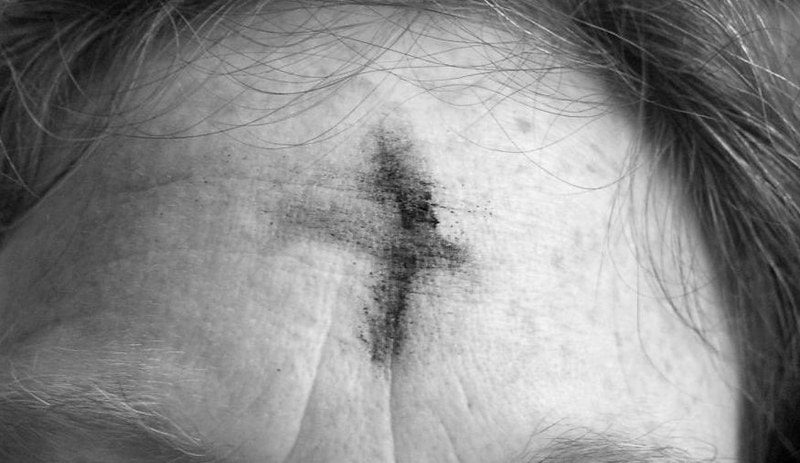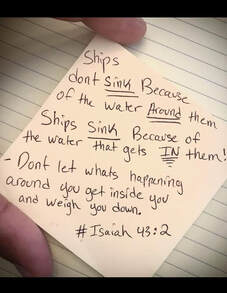PASTOR'S BLOG
Discovering Spiritual Truths & Celebrating God's Grace in the Every Day Happenings of Life.
 “Slowly but surely…” This has been the mantra for my wife and I during the past several weeks as we get “slowly but surely” settled into our new home. Bins unpacked. Moving boxes recycled. Wall hangings hung. Blind fixtures installed. Furniture (at least what we have) arranged. Basement shelves built. But make no mistake, we are still very much a work in progress. Little by little. Bit by bit. Slowly but surely. Though place the order way back in December, we still wait for couches and a dining set to arrive. There are many items that haven’t found a permanent home. The basement is unmercifully flooded with boxes and random objects. And there is definitely no room yet in the garage for my car. (Please know I'm not complaining; this is just a commentary on our reality. I am keenly aware of the "first world" problems to start this post.) As much as I wish it could all be done and put away with just the snap of two fingers, it doesn’t work that way. Of course, we will get there eventually. After all, we haven’t even lived in the home for a full month yet! Slowly but surely we will achieve our desired results, gradually and methodically rather than quickly and spectacularly.
0 Comments
 "For dust you are and to dust you shall return." Genesis 3:19 With COVID concerns still real and restrictions still necessary, more churches than ever (ours included) will not be doing the imposition of ashes this year. And while that may seem strange for some, it can also provide a helpful reality check. Why do we do it? What’s the point? Is our worship invalid or incomplete without it? This now suspended tradition reminds us that all such customs, although potentially helpful, are just man-made symbolic gestures. Think about it, you don’t need dirt on your forehead to remind you that you are soiled in sin and stuck in a fallen world. That evidence is all around us! The prophet Joel reminded the people of Israel that, when it came to repentance, God was interested in their attitudes far more than their actions, attentive to their hearts far more than their visible exterior, concerned with their character far more than their customs. “Yet even now,” declare the Lord, return to me with all your heart, with fasting, with weeping, and with mourning; and rend your hearts, not your garments. Return to the Lord, your God, for he is gracious and merciful, slow to anger, and abounding in steadfast love; and he relents over disaster.” In other words, true repentance is an inward condition, not an outward appearance. God wants our hearts, not our foreheads. True repentance is not a matter of ashes underneath your hairline, but a repentant posture of the heart before God. "Lord, I'm flawed and a failure. But I am yours, save me!" This is a confession we can make no matter the use of external traditions or practices. But if we can use something so that these resonate a bitter deeper, in a way that convicts us and strikes us to our sinful core than so be it. As such, the reason for this ritual practice that starts the season of Lent boils down to three primary purposes: First, the ashes remind people of their sinfulness. Second, the ashes remind people of their mortality. Third, the ashes remind people that they have been redeemed. If you partake in ashes or not (this year or any other), just remember this... whether you receive that dirty smudge and reminder of death on Ash Wednesday or not, what is far more significant than the symbolic act of putting this mark of ashes on the forehead, is the Gospel-laden action of washing them off afterwards. The ashes are only worth “celebrating” if it serves to bring us back to the soul-cleansing, dirt-washing, sin-removing work of our Savior Jesus. In Jesus, our slow-to-anger and merciful God relents over our deserved and pending disaster. We are plucked from the perils of wrath and hell, and placed into the cleansing blood of Jesus. No longer is our final destination the dust of the ground, but now we look forward to the beautiful gates of paradise. As a believer splashes water on his/her forehead to remove that dirty mark, we remember our baptism where we were cleansed of sin through water and the Word. We know we can’t save ourselves so we “rend our hearts” back to the Lord to receive the gift of purifying that only Jesus can give. Whether literally marked with ashes or not, we enter the penitential season of Lent praying that God would have mercy on us, forgive us our sin and bring us to everlasting life! "Create in us a clean heart, O God, and renew a right spirit with us" (Psalm 51)  I've come across this picture many times. I'm not sure of it's origins so I can't give proper credit to the phrase or the photo. Nevertheless, it's a good note of encouragement to keep things in perspective. Easy to read. Nearly effortless to remember. Certainly simple enough to post onto our timelines and newsfeeds. Yet often much more challenging to actually put into practice. The world overwhelms us with responsibilities and commitments. We have much to do. We have bills to pay. We have children to parent. We have work deadlines to meet. We have tasks to accomplish. We have expectations to live up to. In the chaotic and busy lives of His people, God promises to be with us. He doesn't leave us to ourselves, drowning in a sea of responsibilities and unending to-do lists. In stress and in grief, He is there. In thralls of depression and ensnared in a funk, He is there. In exhaustive loneliness and untamed anger, He is there. God is with you. These are the words of Isaiah written on the post-it note: "When you pass through the waters, I will be with you; and when you pass through the rivers, they will not sweep over you. When you walk through the fire, you will not be burned; the flames will not set you ablaze.” (43:2) This reflective snapshot of Israel’s history reminds us that God will not allow anything to destroy His beloved people. We still walk through the dangerous waters and threatening fires, but we will be divinely protected. To those He has created, redeemed, and called by name He invites us to cast aside fear in favor of faith. He is alone is our Savior and source of peace. No matter what’s happening around us, if we try to keep the proverbial water out of our lives ourselves, we will inevitably be weighed down and sink. Instead, turn to the Lord. He is there. He loves you. He is with you. Don’t look inwardly; but look outside of yourselves and up to the heavens. Then pray over these words from scripture, “…those who wait on the LORD shall renew their strength; they shall mount up with wings like eagles; they shall run and not be weary; they shall walk and not faint.” (Isaiah 40:31)  I remember coasting through my senior year of high school. I had already been accepted to the college I was planning to attend and the majority of my course load was either required or relatively easy. Senioritis had kicked in and was in full effect! But then there was my still 100% required English class. Though the class itself was not incredibly difficult nor was the classwork too burdensome, I had coasted a bit too long and a bit too far. Not-so-suddenly my grade dropped to the danger point of not being able to graduate. Yikes, talk about a wake-up call! A direct result of my laziness and thoroughly enjoying the fun of a socially active senior year left me in a precarious position. Fortunately, with a few extra assignments and a generous, albeit a bit wacky, English teacher, I was able to finish the year off strong. I passed the class and did not have to miss any of the graduation day festivities. There is great danger in coasting through things. We miss important events, overlook essential details, or we fall into an apathetic laziness that can have all sorts of ramifications for our lives. This year, as the church season of Lent soon begins, we would do well to ensure we don’t miss the indispensable narrative of Jesus’ passion week. Lent is a season of 40 days where we take time, intentionally and meditatively, to zero in and reflect on the need for and preparations of Easter Sunday. We dare not coast through Lent. It could be an easy trap though, anxiously anticipating the victorious celebration of Easter without taking time for prayerful self-examination. That’s like celebrating the cure without acknowledging the severity of the disease. Our gratitude and excitement for Easter is more deeply appreciated when we take time to consider the brokenness brought on by our sin and the suffering of our Lord. During the season of Lent, we see God putting back together a shattered world, and more importantly our shattered relationship with the Creator. We dare not miss this story because we’re too busy or distracted. We dare not overlook it because we’re having too much fun or spiritually slacking off. We dare not become so apathetic of despondent from COVID restrictions and wearisome limitations that we see Lent come and go without giving it any time or meditation. Think of it this way… When driving a car, if I take my foot off the pedal, the car does not speed up. It doesn’t even maintain the same speed. Instead, from the very moment I take my foot off the accelerator, the car begins to slow down. Allowing the car to coast is inviting the car to stop. It may take some time, but left on its own, the car will stop eventually. It is inevitable. Before you know it, a long hill or unanticipated obstacle comes and you don’t have the momentum to move forward. This Lent I encourage you be intentional about not coasting in your relationship with Jesus. Lent is not a time for us to take the foot off the pedal, but to intentionally keep moving to Jesus. Find a resource, like this one here, to study and grow—grasping tightly to the incredible tools the Lord gives us in His Word and in worship to ensure our coasting doesn’t end in a complete spiritual stop! |
AuthorPastor Steve Vera Categories |